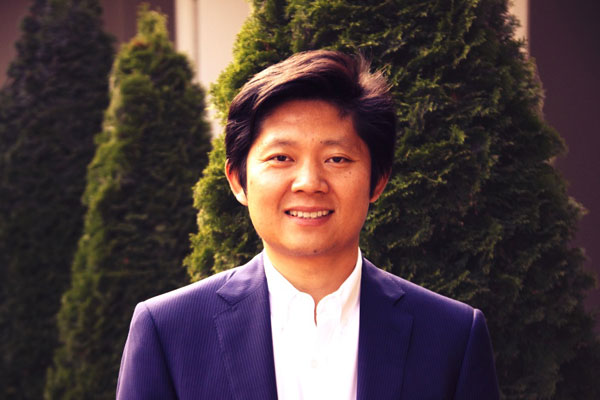 |
|
Zhou Yaopeng, a 36-year-old native of Beijing, co-founded Smart Vision Labs to create a handheld device for smartphones that detects and analyzes vision problems of patients. Zhou says he hopes the device can help provide affordable eye care to every part of the world. PROVIDED TO CHINA DAILY |
When Zhou Yaopeng was a graduate student at Boston University, he worked at Massachusetts General Hospital building an optical instrument that performed retinal imaging.
The instrument he was working on was big and expensive.
A few years later, Zhou, trained as an engineer, read how the world has an eye-care problem, with people lacking access to affordable care, and he connected the dots.
"I was inspired," he said. "I said, 'Why don't I build the same thing again, but this time on a much smaller scale? On a smartphone?' "
That's how Zhou, a 36-year-old Beijing native, came up with the idea of Smart Vision Labs, which he co-founded with fellow Boston University College of Engineering graduate Marc Albanese. The company invented a handheld device that connects to a smartphone, which then scans a person's eyes and determines whether or not prescription glasses are needed.
"Our mission is simple: We want to use this technology and this device to provide affordable eye care to every part of the world," he said.
It costs about $4,000 and weighs about 900 grams, compared with typical machines used by optometrists and other eye professionals that cost from $20,000 to $60,000 and weigh about 50 pounds. The portability and affordability of the product make it ideal for eye doctors who work around the world, and for consumers, Zhou said.
The product — both the hardware and the software on the phone that analyze the scans and determine a prescription — uses the same technology as the device Zhou was working on at Mass General, but is engineered differently, he said.
"The physics is actually pretty simple," he said. "We have a light source, which through the eye hits the retina, and then on its way back out, scatters out of the retina. On the way back out, it goes through the cornea, the pupil. Then we collect the reflected light through the smartphone camera," he explained.
If a person has perfect vision, the light bends a certain way, and if a person has imperfect version, the light bends the other way. The Smart Vision Labs product — called the Smart Vision One (SVOne) — mathematically collects the image and analyzes it to come up with an eyeglass prescription.
The device and software took about two years to develop and manufacture, aided by a $1 million reward from Verizon, and it is now a registered Class I medical device, which allows the company to market and sell it within the US.
Still, the SVOne might be expensive for people living in developing parts of the world who have a greater need for affordable eye care, Zhou said.
"The optimal price for this product is probably $800 to $1,000, and we're striving to go towards that direction," he said. The company is currently trying to raise more money and generate more revenue to continue to develop the product.
The goal is to get the device to all parts of the world, which Zhou said the company already has begun to do, shipping it to nine countries. In a six-month period, Smart Vision Labs has performed more than 2,000 exams and provided over 300 pairs of glasses, working with NGOs and companies that donate or provide glasses.
"When you hear some of these stories, you get really very emotional," Zhou said. "There was a school kid, nine years old, living in Haiti, who people thought could see well, but actually had bad vision," Zhou recounted.
"He couldn't do well at school because he had 20-80 vision, and he could never see the blackboard. With the device, he was able to get a pair of glasses and see 20-20. This is the kind of example happening with the help of our technology, so we think we can make an impact to a lot of people," he said.